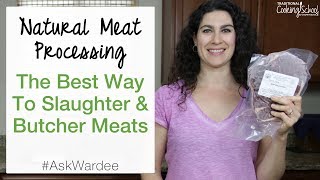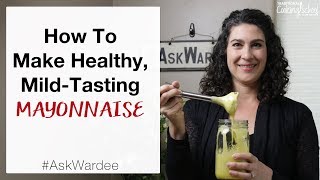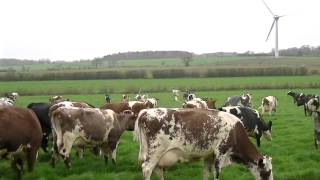Saturday, 17 January, 2026г.
















Где искать: по сайтам Запорожской области, статьи, видео ролики
пример: покупка автомобиля в Запорожье
Is Dairy Really Good For You? | #AskWardee 077
Is Dairy Really Good For You? | #AskWardee 077 | Transcript at http://TradCookSchool.com/aw077 | FREE Thick Raw Milk Yogurt Recipe http://TradCookSchool.com/freeyogurt
It’s frustrating…
One person says milk and dairy products are good for you, others say to eat only raw dairy, and still others say to avoid dairy completely.
Who do you believe? Who do you follow?
You might already know that I’m in the middle camp (consume only raw dairy)…
However, I am 100% in favor of doing what’s best for your body.
I’m not going to throw dairy under the bus with a blanket statement that it’s all bad, yet I do think it’s possible that some people should avoid it for health reasons.
**The Question
Stephanie L. asks:
"I keep going back and forth on dairy, having read The Untold Story of Milk by Ron Schmid a few years ago. I know that raw milk is good for you, but so many of the health summits I’ve listened to online the past couple years repeatedly state for optimal health, “get off sugar, gluten, dairy, etc…”
Can dairy truly benefit us? My husband is lactose intolerant which weighs in, too. Having read a little from the Fermentation purchase I made last year, maybe we could overcome that."
** My Answer: Yes, Raw Dairy Is Good For You*!
Those health researchers are mostly speaking to the general public who are consuming conventional dairy.
Ok, yes, maybe in some cases, they’re speaking to an audience that is consuming raw dairy (or fermented raw dairy like yogurt or kefir).
Unfortunately, they don’t qualify their statements as whether they’re referring to conventional or artisan dairy. So, I take their recommendations with a grain of salt.
Because… if they are talking about conventional dairy, they’re absolutely right.
Conventional dairy should be avoided as much as possible. It’s no longer a real food!
The animals are raised in abhorrent, sick conditions; the milk is often laced with pesticides, GMOs, antibiotics, and hormones. Then, it’s pasteurized and/or homogenized. This destroys enzymes, probiotics, and vitamins — it’s totally denatured.
On the other hand, raw dairy — especially pasture-raised raw dairy — is abundant with probiotics and enzymes. The notable enzyme is lactase, which is essential for digesting the milk sugar (lactose).
Pasture-raised dairy, from animals that are healthfully feasting on rapidly growing green grass, is also rich with healthy saturated fats, Omega-3s, and the fat-soluble vitamins A, D and K2.
**When Should Raw Dairy Be Avoided?
Although I’m not a doctor and can’t give medical advice, I know of some situations where people are advised to avoid dairy (even raw) for good reasons.
Perhaps the individual is trying to heal the gut…
Lactose (milk sugar) feeds undesirable organisms and therefore should be avoided completely. Fermented raw dairy, however, with lactose reduced 100% — such as 24-hour yogurt or kefir — might be fine to introduce! Be sure to follow the recommendations of your natural physician or healing protocol.
Casein (milk protein) can be hard to digest for someone with compromised digestion. Therefore, to heal and reduce irritation, that person avoids milk and dairy.
Children with autism often do better when their parents eliminate food allergens in the diet such as milk protein and/or milk sugar.
People with health conditions that involve insulin sensitivity, like diabetes or PCOS, often need to scale back or eliminate the actual milk in favor of long-fermented dairy with lactose reduction.
Someone who is simply allergic to casein or lactose (or other components of milk) will feel better not eating dairy — raw or otherwise.
Finally, there is a genetic defect which affects the protein in the milk of conventional cows such as Holsteins. While heritage cows are not always free from this defect, many are. Holstein cows’ milk protein is called A1, and heritage cows’ milk protein is called A2. Some people cannot consume A1 milk, but they can consume A2 milk.
**What About Lactose Intolerance?
Often, lactose-intolerant individuals are able to consume raw dairy because it “comes with” lactase, the enzyme required to digest it. This lactase is destroyed during pasteurization, yet abundant in raw milk.
Or, if this person still has trouble with even raw milk, they could add these lactase drops to raw milk.
Lactose can be naturally reduced through culturing — especially by making raw milk yogurt that ferments for at least 24 hours. Here’s my FREE Thick Raw Milk Yogurt Recipe: http://TradCookSchool.com/freeyogurt
Get All Links Mentioned Here (at the transcript):
http://tradcookschool.com/aw077
Join the fun live every Wed at 10am P / 1pm E at http://tradcookschool.com/fblive
See you next Wednesday!
Теги:
wardeh harmon wardee harmon askwardee12345! gnowfglins12345! cultured dairy raw milk gnowfglins is milk good for you is dairy good for you is raw milk good for you kefir yogurt good cultureddairy12345! fermenting12345! nourishing traditions weston a. price foundation traditional cooking traditional foods traditional cooking school
Похожие видео
Мой аккаунт


 У вашего броузера проблема в совместимости с HTML5
У вашего броузера проблема в совместимости с HTML5


